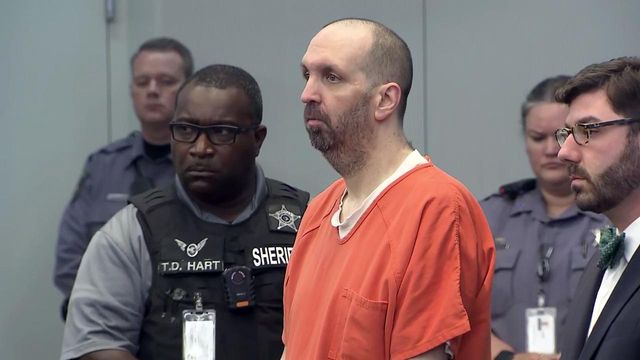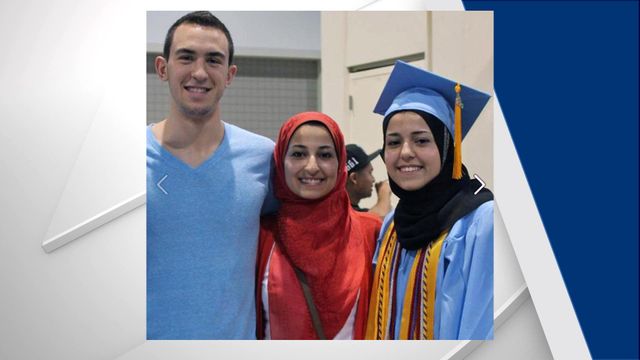Chapel Hill man gets 3 life sentences for gunning down Muslim neighbors
A Chapel Hill man pleaded guilty Wednesday to killing three of his neighbors more than four years ago in what prosecutors and the victims' relatives called a hate crime because they were Muslim.
Posted — UpdatedCraig Stephen Hicks was sentenced to three consecutive life sentences for the Feb. 10, 2015, deaths of Deah Barakat, his wife, Yusor Abu-Salha, and her sister, Razan Abu-Salha. He also pleaded guilty to discharging a weapon into an occupied dwelling and was sentenced to 64 to 89 months in prison for that.
"In 36 seconds, Mr. Hicks executed three people," Durham County Assistant District Attorney Kendra Montgomery-Blinn said.
Hicks told investigators that he was upset that Barakat and the Abu-Salha sisters were taking up too many parking spots at the Finley Forest condominium complex and that, when he confronted them, he overreacted when they cursed at him.
Barakat's sister fainted in the courtroom at the end of the video. A number of other friends and family members sobbed through much of the hearing.
"This [case] is about cold-hearted malice and murder," Durham County District Attorney Satana Deberry said. "It is not about parking."
'Lives collided' in shooting
Montgomery-Blinn said "four very different lives collided" in the shooting.
Yusor Abu-Salha, 21, who married Barakat six weeks before the shootings, was starting dental school at UNC-Chapel Hill and had worked on the Turkey-Syria border to help refugees.
Razan Abu-Salha, 19, was an architecture student at North Carolina State University who worked with homeless people in Raleigh and raised money for Palestinian children in Gaza.
"They were proud to be Muslim, proud to be Americans and were living the American dream," Montgomery-Blinn said.
Meanwhile, Hicks had lost his job, his third marriage was crumbling and he didn't like the changes he saw in his neighborhood, which he complained was "turning into a college dorm," Montgomery-Blinn said.
"The American dream was slipping from his grasp," she said.
She detailed the rocky relationship Barakat, and later his wife and sister-in-law, had with Hicks in the months leading up to the shootings.
Hicks had threatened Barakat and his former roommate several times over parking issues, and when Yusor Abu-Salha moved in after her wedding, Hicks told her mother, "I don't like the look of you people. Get out of here," the prosecutor said.
Even before that, Yusor Abu-Salha told friends in texts that Hicks would show up at Barakat's condo with his hand on a holstered gun to complain about parking, Montgomery-Blinn said.
"I stepped in as I shot him, to be honest with you, and they started screaming, and I saw the one that mouthed off to me before, so I shot at her, and I walked over and shot her and shot the other one," Hicks told police hours later.
Relatives said Barakat wanted to record the encounter so he could get a restraining order against Hicks.
After the shootings, Hicks drove off for Jordan Lake, where he spent about an hour before driving to Pittsboro and surrendering at the Chatham County Sheriff's Office, Montgomery-Blinn said.
Setting narrative straight
Investigators said they were stunned by Hicks' "surprisingly jovial" mood after the shootings in which he spun the narrative that Barakat and the sisters cursed him and that Barakat might have even lunged at him with a knife, Montgomery-Blinn said.
"If you're going to keep disrespecting me, I'm going to start disrespecting you," Hicks told police about his attitude toward Barakat.
The parking dispute story continues to anger relatives of the three victims, who said Wednesday that they were pleased the narrative had finally been corrected.
"This is as much a long-standing dispute over parking as Rosa Parks was over a bus seat," said Farris Barakat, Deah Barakat's brother. "My brother went out in a brave attempt to defend his wife and his house from further intimidation, from further harassment."
"You lied to police, saying they provoked you, that they were profane with you, that they fought you. You tried to assassinate their character," said Dr. Yousef Abu-Salha, the sisters' older brother, referring to Hicks only as "the hateful murderer."
Samuel Sommers, a Tufts University psychologist who specializes in "intergroup bias," testified at the sentencing hearing that, based on his review of the case, that it's highly unlikely the shootings were a random act of violence.
"There are multiple aspects of their interactions – the victims and the defendant – that show the hallmarks of these victims being seen differently because of who they were," Sommers said. "He viewed them as the other, as 'them,' as not part of his own group that he would empathize with and give the benefit of the doubt to."
"Let's call this what it is – a terrorist attack," said Dr. Suzanne Barakat, Deah Barakat's older sister. "Deah, Yusor and Razan died because they were Muslim."
NC lacks hate crime law
Joe Cheshire, an attorney who represents the victims' families, said he hopes the Chapel Hill Police Department apologizes for putting Hicks' story of a parking dispute out, and he criticized the media for running with it.
Chapel Hill Police Chief Chris Blue issued an apology a few hours later:
"What we all know now and what I wish we had said four years ago is that the murders of Deah, Yusor, and Razan were about more than simply a parking dispute. The man who committed these murders undoubtedly did so with a hateful heart, and the murders represented the taking of three promising lives by someone who clearly chose not to see the humanity and the goodness in them," Blue said in a statement. "To the Abu-Salha and Barakat families, we extend our sincere regret that any part of our message all those years ago added to the pain you experienced through the loss of Our Three Winners. And, to the Muslim members of our community, know that you are heard, seen and valued."
Government failed the families, Cheshire said, by not considering the shootings a hate crime.
"What you all have seen here today is what hate looks like," Cheshire said in a news conference after the sentencing. "Hate, today, permeates our society at every level. It's even stoked by many of our elected officials and far too many of our citizens, and we are tolerating it."
"They were different, and now they're dead because they were different," Cheshire said.
The U.S. Department of Justice said the shootings couldn't be prosecuted as a hate crime, and North Carolina lacks a hate crime statute. The state has only enhanced penalties for misdemeanor crimes if they were committed "because of a victim's race, color, religion, nationality, or country of origin," but nothing for a murder case.
Cheshire said federal law has too many loopholes that need to be fixed. He challenged North Carolina legislators to change state law.
"They’re in session right now, and they can stand up and prove that they care about all of the people of North Carolina, not just some," he said. "If they don’t, we will know exactly who they are and exactly where they fall in the fight for justice for all people."
Some lawmakers worked to change that earlier this year. The Hate Crimes Prevention Act, filed in both the House and the Senate, would have strengthened training for law enforcement officers and created a hate crimes database, but neither bill got a hearing.
"His hate of Islam drove him to kill three innocent people," she said. "He is now where he should be – relegated to a footnote in history.
"From now on, history will lift up the lives and legacies of Razan Mohammed Abu-Salha, Yusor Mohammed Abu-Salha and Deah Shaddy Barakat, not their tragic and senseless murders," she added. "Today was about showing the love and light in their lives and how their sacrifice has drowned out the darkness that still exists amongst us."
• Credits
Copyright 2024 by Capitol Broadcasting Company. All rights reserved. This material may not be published, broadcast, rewritten or redistributed.






